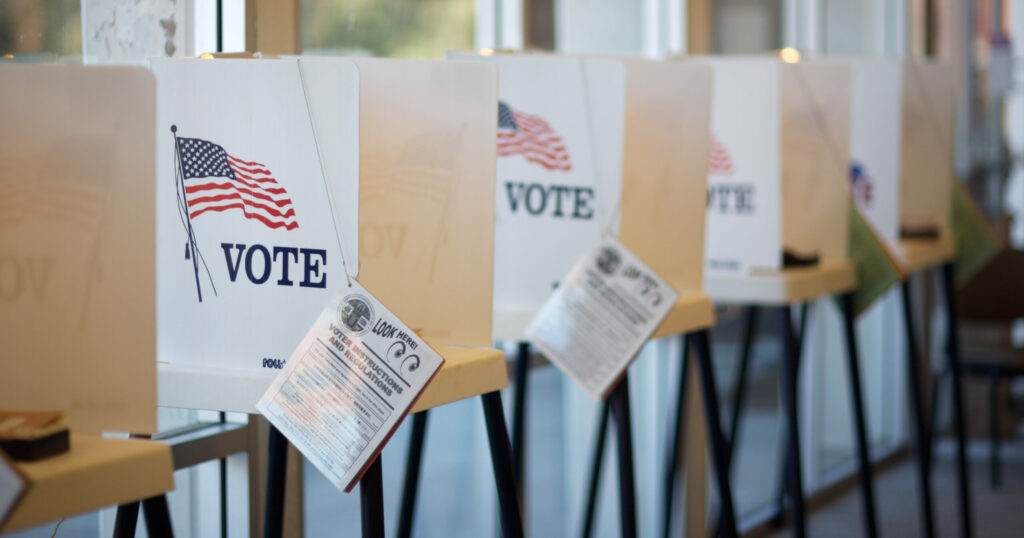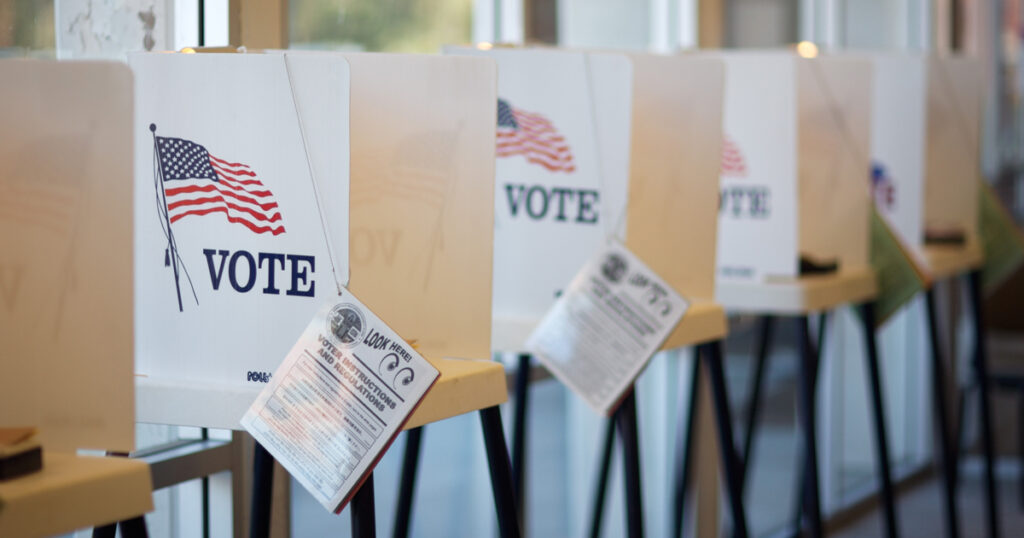By Joel Biermann
Throughout the month of September, The Lutheran Witness will be sharing articles from our August 2020 print issue on topics related to religion and politics. Stay tuned to LW online to follow along.
Religion and politics
One of the cherished notions that typically guides the lives of Americans is that politics and religion do not mix. Of course, there are some areas of overlap that Americans accept and even expect, like a prayer at a presidential inauguration or candidates ending speeches with “God bless America.” But, on the whole, it is taken for granted that there needs to be a clear distinction or even a wall of separation between church and state. People do not want the government telling them what to believe about God, and they do not want the church telling them how to vote. Actually, they do not want anyone telling them how to vote.
In our lives as citizens of a democratic republic, the voting booth is considered sacred ground. In this revered space each person exercises his right of franchise and votes for people, proposals and platforms as he chooses. Voting, it seems, is the ultimate exercise in individual choice and the expression of personal opinion. No one tells you how to vote; no one but you decides how you cast your ballot. And no one knows your vote unless you tell them — well, almost no one.
God knows, of course; Christians know that. And Christians know that strict divisions between the different parts of their lives make no sense, or at least they should not make any sense. As people who follow Christ, we understand that no part of our lives lie beyond the claim of our Savior and Lord. As believers, we belong to our Lord completely, and our lives are normed by Him entirely. God directs all the spiritual and all the material aspects of our lives. He teaches us not only how to receive His gifts and worship Him, but He also teaches us how to be creatures as He intended. Such direction touches every part of our lives — including the political part of being the citizen of a nation. There can be no doubt, then, that God most certainly goes with you into the voting booth and has something to say about the ballot you cast.
A two realms guide
Emphasizing the unity of the spiritual and temporal aspects of our lives to better understand a Christian approach to voting does not negate the distinction between them. In fact, it is the biblical and confessional understanding of God’s two kingdoms or realms that guides this right understanding of voting. Simply put, the teaching of the two realms helps us see that God is directly involved in caring for His creation in two different but complementary ways. In the spiritual realm, He answers our need for a right relationship with Him and through His church gives us forgiveness and grace in Christ. In the temporal realm, He enables us to live in right relationships with one another as He provides for all that we need to live in this world and through His appointed government extends His justice in the world (Rom. 13:1–7). The realms are not in opposition or competition, but together work to accomplish God’s purpose of claiming, preserving, saving and finally restoring the whole creation.
It is in this context of the two realms that we understand what it means to vote. Voting is an activity of the temporal realm, one of the many ways that we strive to uphold God’s justice and live in right relationships with other creatures. As citizens of a democratic republic, we participate in government in ways unimaginable to our fathers in the faith. When we vote, we are the government. Voting, then, is no mere right or privilege; it is a holy obligation, a responsibility, a small but significant vocation given by God to each Christian citizen. You need to vote.
What does this mean?
So, how does God want you to vote? Actually, that is not a trick question; it has an easy answer: God wants you to vote for the people, principles and platforms that will uphold and advance His justice in the world. In other words, you should vote in ways that will best serve your neighbor and his needs. A Christian never votes for the proposal or the candidate that promises to make her own life somehow better or that resonates with a favorite cause or interest. The Christian’s objective is always aimed out, focused on doing what helps the other. When the time comes to determine how best to serve which neighbor, things get quite interesting.
Christians often debate fiercely among themselves about what is just, most just or patently unjust. But justice is not an amorphous idea or a hollow husk waiting to be filled with meaning according to the dictates of particular conscience or the whims of personal conviction. The definition of justice is not determined by what makes sense or what feels right or what seems fair. God, who created the world and set in place the rules for how the world works (Psalm 96:13), establishes what is just. That is precisely the function of God’s eternal Law that is hardwired into the very fabric of the creation (FC Ep VI 6–7). For Christians who seek to honor God and serve their neighbor by the way they vote, God’s Law is the guide. And God’s Law is not a chaotic competition of conflicting rules or standards. Yes, discerning the path of justice can be complicated. Since we each have almost 8 billion neighbors — just counting the human ones — taking into account the application of justice for every neighbor is an overwhelming task. But even here, God’s Law provides us a way of sorting through the myriad demands. They are not all the same, and do not make equal claims on us.
When you cast your ballot, consider the following triage: First, your overriding responsibility is to your nearest neighbor who has the most acute need. The defenseless neighbor faced with imminent death has a more pressing need for justice than the one who may lose access to a favorite meadow where he likes to stroll. Second, the protection of human life outweighs the enhancement of human life. Third, people always rank ahead of animals; and fourth, the stuff we accumulate and want to keep always ranks last. Fifth, and finally, respect for each human person, or basic fairness, ranks ahead of any alleged right to keep what is “rightfully yours.” Christians know that what they have belongs to God, and every one of their nearly 8 billion neighbors is someone for whom Christ died — someone to whom we owe justice in the temporal realm and someone to whom we owe the proclamation of the Gospel in the spiritual realm.
Of course, one must expect that different Christians who faithfully and accurately apply this guide will nevertheless reach different conclusions about the best vote to extend God’s justice. We each have different near neighbors and different understandings of their needs. It should also be expected that there will be more agreement at the top of the triage checklist
and less at the bottom. Basic moral questions touching on the protection of life have simple answers with little room for nuance; intricate policy issues seeking to address economic inequality have complex and variegated answers, and all of them may be legitimate options in the pursuit of God’s justice.
There is something sacred about voting — it is a holy task given to you by God and done for the sake of your neighbor. Cast your ballot wisely, selflessly and confidently. Seek God’s justice for your neighbor and God’s grace for you as you follow your Lord into the thick of a messy and broken world that He is eager to save.
This article first appeared in the August 2020 print issue of The Lutheran Witness.






To Mr. Stevenson’s point – in Sunday’s sermon, our pastor reminded us that God often chose undeniably flawed vessels to accomplish His ordained purposes. The message was not offered as a political directive, but consideration of the ‘heroic heroes of faith’ extolled in Hebrews 11 will free you to consciously vote on issues. Vote accordingly and pray/accept that God’s will be done.
According to Dr. Biermann, our first overriding responsibility in the voting booth is to our “nearest neighbor who has the most acute need.” Our nearest neighbor is our fellow American. Their most acute need is protection and safety for their families and their children. The government’s primary task is to enforce the just laws of the nation, secure the peace for its citizens and exercise the power of the sword against those who break the law. No one can prosper in a lawless society where crime is rampant, and house and business are at risk. The current open border policy of this administration is treasonous at heart toward its own citizens by allowing and encouraging unvetted illegal aliens many who come from gang elements around the world to enter our country who have murdered Americans, destroyed businesses and have taken over real estate in certain cities of our country. Thank you, Dr. Biermann for your trenchant analysis. I shall vote accordingly.
The problem with mudslinging is that it just ends up as a race to the bottom to see who can sling more mud. One’s decent, competent, caring human being is another’s abhorrent sociopath and vice versa.
As we enter the voting booth we need to carry God’s Moral Law as summarized in the 10 Commandments and compared His Moral Law to the various candidates and their party platform and agenda for the future of our nation. We must ask ourselves will this candidate guide our nation in accordance with God’s Moral Law and will this candidate seek to protect our nation from all its enemies both foreign and domestic??? Finally, how has this candidate performed in his/her former political officers???
It is for everyone to show love and care for everyone as God wanted in the beginning and as his son, Jesus Christ became man a gave us guidance to love and care for everyone. Each person’s life is one to one with God, no person on God’s earth can be a judge of another, only God gives eternal life to those that truly believe in God our creator, God’s son and let the Holy Spirit guide their spirit. We are all sinners and those true belief in God, as Noah, Moses and others in the Old Testament believed have eternal life with God. My mother’s first child with her second husband passed away 6 days after birth, I have a neighbor that her mother had twin girls that died the day they were born. Women have miscarriages before giving birth. Genesis 6-2 says “That the sons of God saw the daughters of men that they were fair; and they took them wives of all which they chose.” I find it interesting that God created us in such a way that we do not remember existing in the mother’s womb, and we do not remember the first year’s of our life once we start to remember. It seems to be early protection for our spirit to be born again in another body. So when a women as a child was raped by a man and became pregnant not to her choosing, I believe the spirit that would have entered the babies body would go to another body. Each women’s life, just like all men is a one to one relationship to God and we all are sinners, but sinners that true believe will have eternal life. We are no ones judge and we should never kill others as being done by Russia’s invasion of Ukraine or the raid on the US capital, or the assault on Israel and their revengeful killing. The killings that are randomly happening in the United States. We should show love and care for everyone as God intended when we were created. As with God had Moses lead the Israel people out of slavery for the Egyptians. Most immigrants entering the USA are leaving countries that treat them very poorly. Thanks be to God, our creator, his sinless son, our savior, Jesus Christ and the Holy Spirit. Amen!
There is also the matter of the character of the candidates in question. We are told a tree will be known by its fruit. Can one justify a vote for a person who bears absolutely no fruit of the spirit? If they have no love, joy, peace, patience, kindness, grace, forgiveness, humility, self control? If they are lawless, reckless, disloyal, seditious, divisive, or found guilty of lying in a court of law? A vote for such a person is a vote to do harm to one’s neighbor. This is not a choice between the lesser of two evils. This is one between an abhorrent sociopath and a decent, competent, caring human being.
I would take care before stating that the election “is one between an abhorrent sociopath and a decent, competent, caring human being.”
“Let every person be subject to the governing authorities,” writes Paul to the Romans, “For there is no authority except from God, and those that exist have been instituted by God.” I take this to mean that whoever wins the election is the governing authority instituted by God. With all the rhetoric going around, I honestly do not know to which candidate you refer as the abhorrent sociopath and which candidate is the decent, competent, caring human being.
But my counsel is this: Go back and re-read this article. In your own mind, and based on your own experience, put the candidates through the five considerations listed, and then vote your conscience. “To go against conscience is neither right nor safe,” said Luther. And my last bit of counsel is encouragement to ask yourself if, by your words, you are putting the best construction on everything, as is required by the eighth commandment.
Blessings on your day, and upon your holy obligation to vote.
I totally agree.
I do not have the answers to perplexing and contentious issues plaguing our culture, but experience has taught me, as I am nearly 80, that life in America was once more stable, the Judeo Christian faith was respected, and our country was in a better place. Time and chance, and a rejection of God, has wrought a scourge upon the land, and the evidence of popular unbelief brings only sorrow and chaos.